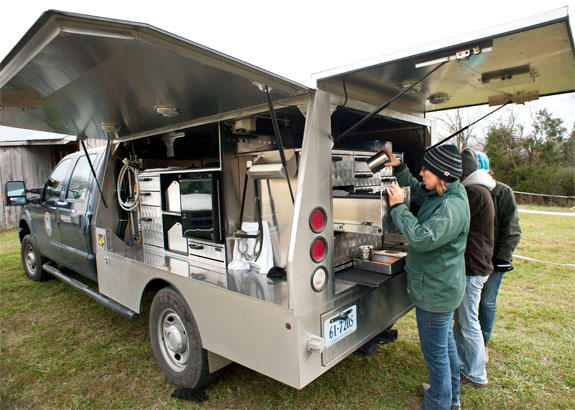HOW TECH TICKS
On a chilly morning in October, a group of clinicians and veterinary students set out in two trucks, taking equine medicine on the road in the New River Valley. The program, known as Equine Field Service (EFS), provides on-the-ground, on-the-farm veterinary care to horses within a 35-mile-radius of campus.

Clinicians, interns, and students from the Virginia-Maryland Regional College of Veterinary Medicine piled into the trucks and rode out to the Campbell Arena on campus, which houses horses for Virginia Tech's riding program. Dr. Becky Funk guided students through a routine chiropractic visit, finding and detecting sore spots for treatment.
"Essentially, what I'm trying to do is restore ... motion. You take a joint through its range of motion and sort of push it," explained Funk as she worked on a series of neck stretches with a horse named Nimue. The students looked on, following Funk's careful coaching and trying to detect a sore or stiff joint.
"It's nice to get out in the field and learn from clinicians how to work with horses and talk to clients," said Theresa Economos, a fourth-year veterinary student. For Economos, who plans to go into equine practice, the three-week stint with EFS confirmed her choice.
"The problems [one encounters] in field services are different than in the clinic," said EFS intern Dr. Annie Martin, who noted that issues arising in clinic visits in equine medicine are often more complex. In the field, visits range from routine to emergency situations. Teams are often on the road all day, especially if a call comes in during another visit.
EFS offers students a chance to experience in-the-field medical care for horses, including vaccinations and deworming; treatment for common conditions, such as colic, lameness, or lacerations; reproductive care and foal checkups; and dental care.
Cool fall air whisked through the barn as the team huddled around one of the stalls, watching Funk work and taking their own turns examining the horse. The team also took time to check up on other horses that had previously been treated for other conditions—one for sinusitis, another for a fractured mandible. Such experiences prepare students for real-world veterinary scenarios. "More of our equine students will be doing field service, so [EFS] gives them a more realistic experience of what they can expect in the future," said Martin.
Though EFS offers services similar to those provided by private practices, Dr. Dana Cook, a clinical assistant professor with EFS, noted that the program is primarily a learning tool meant to provide hands-on experience for students. "The students get to go out and talk to clients and see things that they'd see in the world every day," she said, adding that "in the face of larger class sizes, we have the ability to do some one-on-one teaching."
